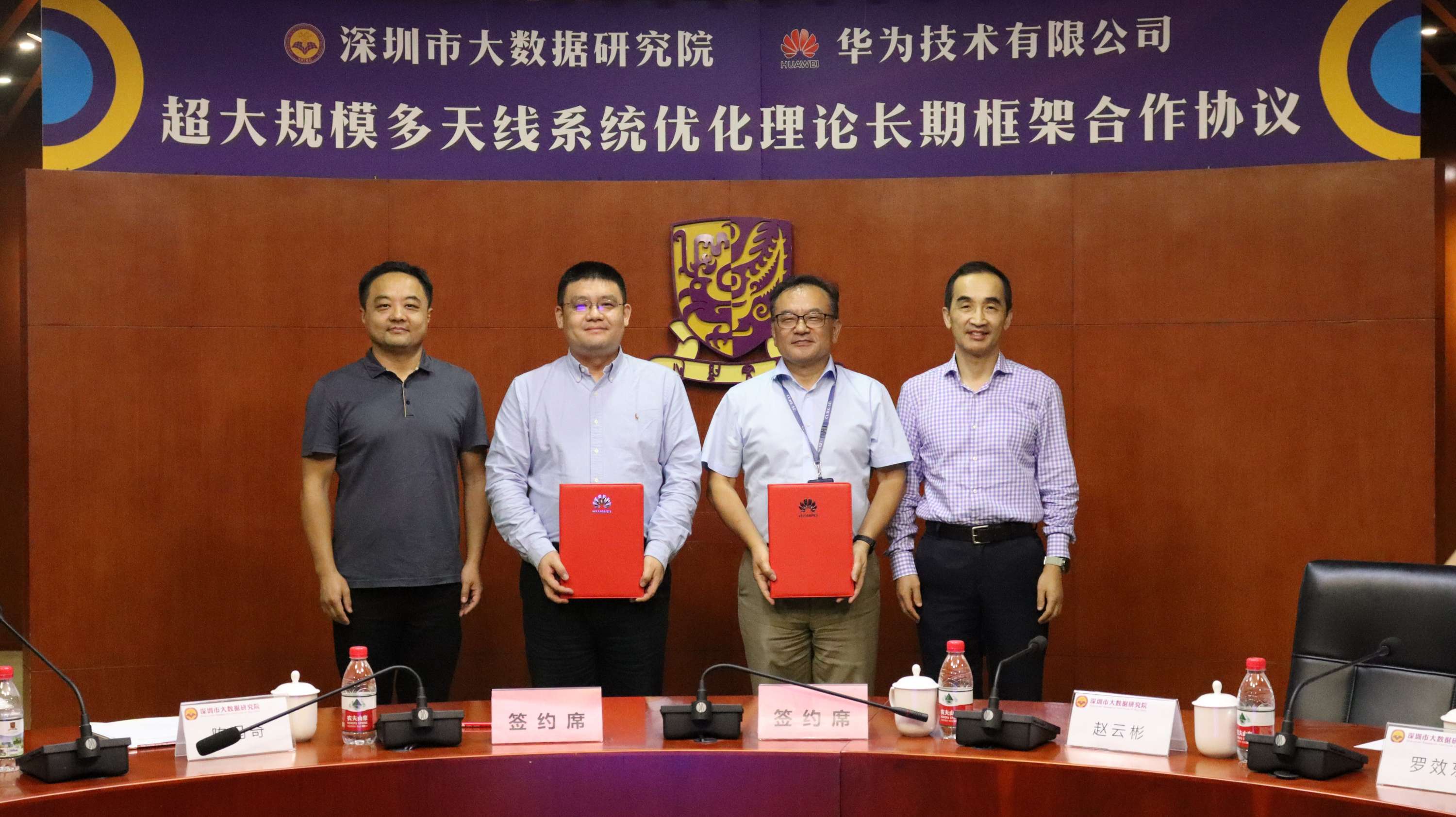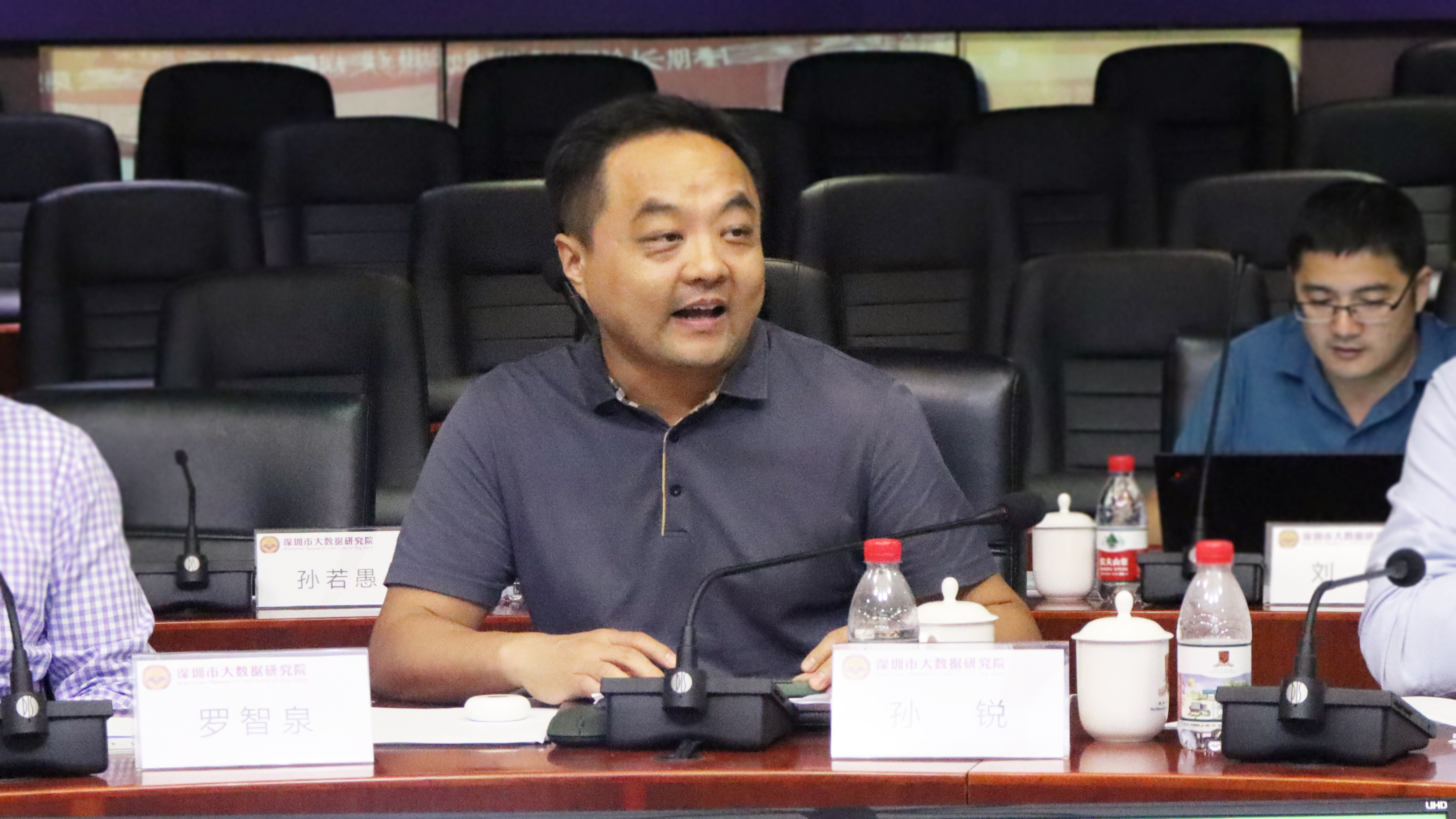SRIBD News
The Signing Ceremony for The Long-term Framework Agreement on The Optimization Theory of Ultra-large-scale Multi-antenna Systems Between SRIBD and Huawei was held at CUHK-Shenzhen
On August 18th, the signing ceremony of the "Long-term Framework Cooperation Agreement between Shenzhen Research Institute of Big Data (SRIBD) and Huawei Technologies Co., Ltd. on Ultra-Large-Scale Multi-Antenna System Optimization Theory" was held in Room 103 of Daoyuan Building at CUHK-Shenzhen. Representatives from Huawei, including Rui Sun, Minister of the Wireless Network Technology Planning Department, Yichuan Yu, Deputy Minister of the Wireless Network Research Department, Peigang Jiang, Huawei Fellow and Chief Expert of Wireless Algorithm, Yanmin Qin, Chief Expert of Wireless Network RAN Algorithm Research and Technology Planning, Yang Ye, Minister of Wireless Network RAN Algorithm Department, Shaobo Wang, Deputy Minister of Wireless Network RAN Research Department, Fengqi Chen, Minister of South China University System Department, Weimin Chen, New Wireless Technology Research Expert, and other Huawei representatives attended the ceremony. Representatives from SRIBD, including Zhi-Quan (Tom) Luo, Foreign Academician of Chinese Academy of Engineering, Vice President of CUHK-Shenzhen and Director of SRIBD, Ping Lee, Executive Director of SRIBD, Rui Zhang, Presidential Chair Professor of CUHK-Shenzhen, Chao Shen, Director of the Industrialization Center of SRIBD, Qingjiang Shi, Director of the Data-driven Intelligent Information System Laboratory, Director Xiaodong Luo of the Institute of the Optimization Solver Development Laboratory, Director Yunbin Zhao of the Institute of Center for Division of Fundamental Research, Assistant Dean of the School of Science and Engineering at CUHK-Shenzhen and Vice Director of the Data-driven Intelligent Information System Laboratory at SRIBD, Tsunghui Chang, and other representatives also attended the signing ceremony.

In the past decade, massive MIMO technology has made significant contributions to improving network coverage, user experience, system capacity. It has helped the global wireless communication industry switch from 4G to 5G. The ultra massive MIMO technology focused by DIIS at SRIBD and the wireless network research team at Huawei is an exploration of further development of massive MIMO technology. Both parties is looking forward to using this long-term collaboration to assist in the in-depth research and implementation of 5.5G ultra massive MIMO technology, providing higher spectrum efficiency and energy efficiency for current mobile communication systems, and empowering more innovative fields.

At the ceremony, Academician Zhi-Quan (Tom) Luo first expressed warmly welcomed to the colleagues from SRIBD and Huawei partners in attendance. He stated that Ultra Massive MIMO technology, due to its high-frequency efficiency advantages, has received widespread attention from academic and industry and is one of the core issues in Huawei's 5.5G era vision planning. In the past, SRIBD and Huawei have cooperated in intelligent theory and methods, distributed collaboration, and have achieved good results. Next, the two parties will continue to conduct more in-depth research around the core issues, overcome the problems of high complexity and low efficiency of current antenna technology, and promote industrial applications. The optimization technology team of SRIBD has industry-leading expertise, and this cooperation with Huawei's strongest research department hopes to jointly advance technological development and lay a good foundation for long-term cooperation in the future. He expressed gratitude to Huawei for their trust in SRIBD and also looks forward to SRIBD continuing to assist Huawei in solving difficult and painful problems encountered in the industry in the future.

Minister Rui Sun gave a brief introduction of the core members of the department team, hoping that the upgraded team will better support the practical cooperation between SRIBD and Huawei. He stated that SRIBD and Huawei have produced fruitful results in their collaboration last year, and many research achievements have had valuable practical effects on current products. Compared to previous collaborations, the framework agreement signed this time has a longer-term vision, focusing on more difficult problems that may not immediately produce benefits, not caring about short-term gains and losses, and hoping to bring more profound impact to the industry. Optimizing massive MIMO systems is not a single technical point, but a main direction. For companies, it is a shift from single-task processing to systemic thinking. Huawei looks forward to working with the academic community to create greater value. The next three years are a critical stage for 5.5G, and he hopes that both sides can seize this time to create greater value.

Following that, Peigang Jiang summarized the existing cooperation between the two parties, and awarded recognition for two research achievements from SRIBD. Weimin Chen, an expert in new wireless technologies at Huawei, briefly introduced the plan and challenges of the framework cooperation. Subsequently, under the witness of Academician Zhi-Quan (Tom) Luo and Minister Rui Sun, Ping Lee and Yichuan Yu signed the framework agreement on behalf of the research institute and Huawei, respectively.
After the signing ceremony, Professor Tsunghui Chang, Professor Qingjiang Shi, Dr. Rui Zhou, Professor Xiaodong Luo, and Professor Ruoyu Sun gave technical presentations on their respective research areas and had in-depth discussions with the experts and scholars present.




